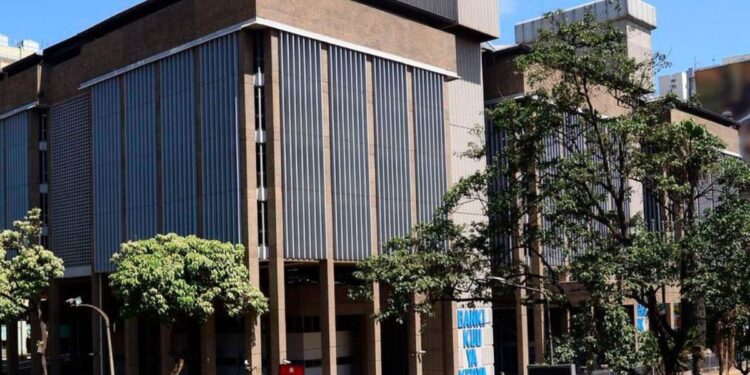Kenya has witnessed substantial increase in its debt levels in recent years. According to the Central Bank of Kenya, the total public debt was Ksh 10.9 trillion as of December 2024, equivalent to approximately 70.8% of GDP.
Domestic debt stood at Kshs 5.87 trillion, while external debt was Ksh5.06 trillion.
The country’s debt service obligation for the financial year 2024/25 is Kshs 1.85 trillion, with Kshs 843.5 billion allocated to debt redemption and Kshs 1.1 trillion for interest payments.
The significant debt burden poses serious economic risks, including concerns about the country’s fiscal sustainability and the ability to meet its debt obligations.
Furthermore, repaying government loans at a higher interest rate puts additional strain on the government’s finances.
The risk of defaulting is high if the government fails to adopt stringent measures to manage borrowing. Here are several ways the government should apply to solve its current debt crisis.
Key Options for Resolving Kenya’s debt crisis
Cut government recurrent expenditure
The rising debt is mainly driven by the persistent fiscal deficit arising from high government spending. The recurrent expenditure as a percent of total government expenditure has increased significantly over the past years, squeezing funding for development projects. In the 2024/25 fiscal year, recurrent expenditure stood at approximately Ksh 2.781 trillion, representing 15.4% of the country’s GDP. The high recurrent expenditure is primarily attributed to our expensive system of governance.
To address the debt crisis, the government should streamline operations and improve efficiency in public health service delivery by adopting technology and automation. Reducing the number of ministries and state departments will also go a long way in cutting government expenditure. Pay cuts for government staff are also important. Reducing recurrent expenditure would allow the government to reallocate resources to critical sectors like agriculture, transport, energy, health, and education.
Expand investment in mining and leather/textile industries
Given full attention, the mining, textile, and leather industries have the potential to spur economic growth and create jobs, particularly for our young people. The government can generate more revenue by expanding the exploration and extraction of our mineral resources. Transparency and sustainable management are key to optimal natural resource utilization.
Stop corruption
Corruption, at the national and country level, limits Kenya’s economic growth. It leads to the misallocation of borrowed funds, reduced returns, and unjust enrichment of a few people. Artificial intelligence (AI) can help fight corruption in areas such as procurement by detecting irregularities and conflicts of interest. This can reduce government expenditure, and ensure borrowed funds are spent on projects with high economic returns.
Recover stolen funds
The government must strive to recover stolen funds. Such a move would deter corruption by sending a strong message that corruption will not be tolerated. Additionally, the recovered funds can be used to pay our debt or finance development projects.
Improve ease of doing business
The government’s economic plan should incorporate clear measures to improve the ease of doing business in the country. Key measures to achieve this include reducing tax rates and simplifying and streamlining the process of starting and running a business. Providing a competitive and attractive business environment is crucial for fostering innovation, productivity, and economic growth.
Reduced taxes increase disposable income for individuals and households, leading to increased economic activity and higher tax revenues. The government should avoid exploitative, oppressive, and extractive taxes that trigger tax evasion and avoidance.
Transparency and accountability
Disclosure of critical information about public debt is crucial. This includes the disclosure of loan contracts to the public, allowing them to examine the details of the contracts. Transparency ensures responsible borrowing since the government will be held accountable of questionable loan contracts. It also ensures loans are utilized for projects with significant economic returns. Citizens must contribute to decisions on public debt acquisition and spending.
Strategic investment of loan money
The government should only invest loan money in projects with clear economic benefits. Thorough feasibility studies are crucial before seeking loans to ascertain the project’s capacity to promote the country’s long-term economic growth. Investing in projects without economics only enriches a few people while increasing our debt burden.
Ban gambling, and get young people working
Gambling puts immense pressure on our economy and indirectly contributes to our rising debt. Recent media reports suggest that Kenyans placed bets amounting to Ksh 766 billion in 2024. A huge proportion of that amount is withdrawn from our economy, causing a string of other issues such as reduced money supply and widespread closure of businesses. The adverse social consequences of gambling, including family breakdowns and health-related issues, contribute to increased government expenditure on social programs, creating the need to borrow in the long run. By banning gambling, we can improve young people’s contribution to the real economy, which translates to increased revenue for the government.
Related: Kenya Must Ban Gambling to Rescue the Economy and Its Young People
Increase the country’s exports
The government should work to increase exports through strategic investment in manufacturing. This should be supported by strategies such as diversification of export markets, strengthening of trade policy, reduction of export duties, and improvement in logistics and trade facilitation. An increase in our exports will increase revenue for the country through foreign exchange earnings, which will stabilize the shilling.




